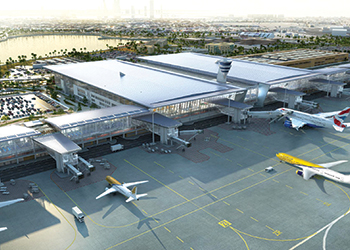Thales and Sita get Bahrain job
01 July 2017
As work continues on the construction of a new terminal at Bahrain International Airport (BIA), the country has awarded its latest contract for hi-tech systems to ensure efficient and secure operations of the airport.
Bahrain’s Ministry of Transportation and Telecommunications has chosen French technology leader Thales and Switzerland-based Sita to provide the security and operations management system for BIA. The contract calls for the complete design and implementation of airport systems to keep pace with the growth in traffic, forecast to reach 14 million passengers a year by 2020.
The $1.1-billion Airport Modernisation Programme (AMP) was launched in 2015 with an overall aim to elevate BIA’s infrastructure and services and make it one of the most important hubs for tourism and services.
This ongoing programme includes the construction of a new passenger terminal and the expansion and refurbishment of the existing terminal. Last year, a joint venture between the Dubai-based Arabtec and Turkey’s TAV Construction won the contract to build the passenger terminal.
Early this year, Finnish firm Kone was awarded the contract to supply 145 lifts and escalators for a new passenger terminal building. Other agreements awarded earlier include an $11.7-million contract with China’s CIMC for the passenger air bridges; a $31-million deal for the baggage handling system with Vanderlande from the Netherlands; and a $29.7-million contract with the US-based L3 Communications for security screening equipment.
With the growing traffic, airport authorities face two challenges: enhancing the security and safety of all the passengers, airlines and staff, and making the airport operations more manageable and more efficient.
As the master system integrator, Thales will deliver an innovative and trusted security system ensuring continuity of operations, centralising the airport operations management and meeting all of the safety and security requirements, according to a spokesman for Thales.
“Thales is a world leader in airport security providing smart airport solutions. We are convinced that rather than simply adding more cameras and sensors, the strength of security and operations management solution lies in the use of smart technologies, enabling operators to monitor all areas of the airport, optimise its performances and make faster, more informed data-driven decisions,” says Marc Darmon, executive vice-president of Thales, secure communications and information systems.
Using smart data processing, the system will provide the operators with a real-time security and operations situation awareness. This security system will be embedded with all the cutting-edge technologies needed for airport management such as smart video-protection, access control and biometrics, IT and telecommunication infrastructures. The airport operators will rely on decision-support tools and procedures to enable a better and faster response time in case of emergency. The system will also allow operators to monitor airport performances.
As a major player in cybersecurity and a world leader in data protection, Thales will finally ensure end-to-end protection of the global solution, providing real time counter-measures against the most sophisticated cyber-attacks. “Thales leverages its international expertise to serve airports with best-of-breed integrated solutions maximising operational performance whilst securing infrastructures, information and the people,” Darmon says.
Thales has implemented several similar projects in the Middle East, including the expansion of Dubai International Airport in Dubai, UAE, and Hamad International Airport in Doha, Qatar. It has also been chosen by Salalah and Muscat airports in Oman which are still under construction. Thales has also provided airport security solutions for Durban (South Africa), Changi (Singapore), Lisbon and Madeira (Portugal), Pisa (Italy) and Lyons (France).
Thales is a global technology leader in the aerospace, transport, defence and security markets. The firm reported sales of €14.9 billion ($16.72 billion) in 2016. Its team of over 25,000 engineers and researchers gives it the capability to design and deploy equipment, systems and services to meet the most complex security requirements.
- Partners in progress
- January launch for Duqm airport
- TAV flies high in region
- Digitalisation focus of key expo
- ACO drains preferred
- Thales and Sita get Bahrain job



